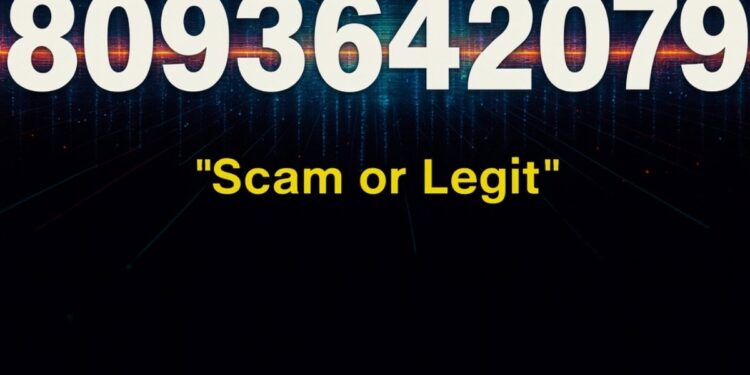In recent months, mobile users across India and beyond have reported an increasing number of suspicious calls from a specific number: 8093642079. What may appear to be just another missed call could actually be a part of a well-organized scam operation. These calls often lure individuals into returning the call, only to subject them to various forms of financial or data theft. While robocalls and telemarketing are nuisances in themselves, the number 8093642079 is allegedly associated with more malicious intent. Understanding the mechanisms behind such scam calls, their implications, and what steps to take can help protect you and your loved ones from potentially serious consequences.
What Exactly Is the 8093642079 Scam?
The 8093642079 scam typically involves what is known as a “one-ring scam.” Scammers use automated systems to dial thousands of mobile numbers and hang up after one or two rings. The aim is simple: provoke curiosity or concern, encouraging the recipient to return the call. Once the victim calls back, they are either charged high fees per minute, routed to a fake customer support line, or engaged in a conversation designed to steal sensitive information.
The scam can escalate in various ways. Sometimes, callers impersonate bank officials or government representatives, threatening legal consequences unless the victim shares personal data or makes an immediate payment. In other instances, they may claim the victim has won a prize but must pay a processing fee to receive it. All of these approaches have one common goal—financial gain at the expense of the unsuspecting person.
Why People Are Falling for It
One of the primary reasons why individuals fall for scams originating from numbers like 8093642079 is psychological manipulation. Humans are naturally curious, and a missed call from an unknown number triggers questions: Who called? Is it urgent? Did I miss something important?
Scammers exploit this vulnerability by creating urgency and fear. They may say your bank account is being frozen, that you’re under investigation, or that you’ve missed a court summons. They often speak in a tone of authority, use official-sounding jargon, and try to make the victim feel cornered. These tactics are especially effective on individuals who are elderly, less tech-savvy, or under stress, making them act without pausing to verify.
Real Stories of Victims Affected by 8093642079
Victim testimonials have surfaced on online forums and complaint boards, painting a clear picture of the scam’s scope. One victim received a call from 8093642079 late at night and returned the call first thing in the morning. The result was a mobile bill that was inflated by nearly 2,000 rupees due to premium calling rates. Another individual received a call claiming to be from their bank’s fraud department. The scammer stated that unauthorized transactions had been noticed on their account and asked the victim to verify their debit card details. Within 30 minutes, their account was wiped clean.
What makes this scam especially dangerous is that it does not follow a single predictable pattern. Some calls are short and hang up instantly; others are long and involve detailed dialogues. The adaptability of the scam makes it more deceptive, catching people off-guard.
How the Scammers Profit from Calls to 8093642079
Scams associated with numbers like 8093642079 often rely on either direct or indirect monetization techniques. The most straightforward method involves routing return calls to premium-rate numbers. These numbers charge high per-minute fees, with a portion of the proceeds going to the scammer or a third-party service they control. Victims may not even realize they’re being charged exorbitant fees until their phone bill arrives weeks later.
Another technique is phishing. Once the caller has you on the line, they might ask you to verify account numbers, card details, or even mobile banking OTPs. Some go a step further and request you to install remote-access apps, giving them full control over your device. These scams are not just about making quick money—they are designed to steal identities, drain bank accounts, and cause long-term damage.
How to Identify a Scam Call from 8093642079
Recognizing scam calls is the first step to protecting yourself. The number 8093642079 might appear to be a regular mobile number, but several red flags can help you identify its malicious intent:
- The call rings only once and disconnects, encouraging you to call back.
- You don’t recognize the number or the caller’s identity.
- The caller applies pressure or uses urgency tactics.
- You are asked for personal, banking, or login information.
- You’re offered prizes, lotteries, or rewards out of the blue.
- The call quality is suspiciously poor, as if routed through international networks.
If you notice any of these signs, it is best not to engage. Letting the call go unanswered and unreturned is often your safest course of action.
What to Do If You’ve Already Answered or Called Back
If you’ve already answered or returned a call from 8093642079, your immediate next steps are crucial. First, do not share any further information. If you’ve given out banking or card details, contact your financial institution immediately and freeze your accounts. It’s also wise to change your internet banking passwords and monitor your account activity closely.
You should report the incident to your mobile service provider so they can flag or block the number. Additionally, report the incident to your local cybercrime authority. Even if no financial damage occurred, your report can help authorities track and shut down such operations.
Installing a reputable call-blocking or anti-spam app on your smartphone can also help you detect scam calls in the future. These apps use community-based reporting to flag suspicious numbers in real time.
Tips to Protect Yourself from Similar Scams
Preventing scam calls requires a mix of awareness, caution, and proactive measures. Here are some effective ways to protect yourself:
- Avoid calling back numbers you don’t recognize, especially if the call was very short or from an unusual area code.
- Use caller ID apps that identify known spam or fraud numbers.
- Keep your phone software up to date to ensure security features are active.
- Never share OTPs, PINs, or passwords over the phone.
- Educate your family, especially seniors and teenagers, about common phone scams.
- Refrain from clicking on links or downloading files sent via SMS or call-back messages from unknown numbers.
Awareness is your best defense. Most scams depend on the victim’s ignorance or emotional response. If you remain informed and calm, you significantly reduce your chances of being tricked.
The Role of Telecom Providers and Authorities
Telecom operators and regulatory bodies are not unaware of the growing scam problem. Many mobile carriers now offer DND (Do Not Disturb) services and spam filters. They also encourage users to report suspicious numbers so that collective data can help track and block them.
Authorities such as national cybercrime units regularly investigate reported scams, but their success depends heavily on user cooperation. The more people report numbers like 8093642079, the easier it becomes to isolate scam networks and pursue legal action against the culprits. Unfortunately, many scam operations operate from countries outside local jurisdiction, making them harder to prosecute—but every report counts toward dismantling their reach.
Why It’s Important to Spread Awareness
One of the biggest challenges in fighting scams like the one associated with 8093642079 is public unawareness. While tech-savvy individuals may be skeptical of unknown numbers, many people—especially the elderly—are less equipped to detect fraud. A simple conversation with a friend, neighbor, or family member could prevent a costly mistake.
Social awareness campaigns, educational articles, and community reporting tools can all play a part in building resilience against scams. If you’ve received a suspicious call, speak about it. Post on community forums or social media. Even if you weren’t tricked, someone else might be.
Final Thoughts: Vigilance Is Your Best Protection
Scam calls like those from 8093642079 are more than just a minor annoyance. They represent a real threat to financial and digital safety. As scammers become more sophisticated, the responsibility of protection lies increasingly with individuals. Understanding the nature of these scams, recognizing the red flags, and taking decisive action can make all the difference.
Never assume that a number is harmless just because it looks ordinary. Always verify, never share sensitive information over calls, and educate those around you. Staying cautious could save you from becoming the next victim of a well-orchestrated scam.
Frequently Asked Questions (FAQs)
1. Is 8093642079 a scam number?
- Yes, multiple reports indicate that 8093642079 is associated with fraudulent activity, including premium-rate call scams and phishing attempts.
2. What should I do if I get a missed call from 8093642079?
- Do not return the call. Block the number and report it to your telecom provider to help prevent further scam attempts.
3. Can I be charged for calling 8093642079 back?
- Yes. If the number is connected to a premium-rate line, you could incur high charges for calling it back.
4. How do scammers use numbers like 8093642079 to steal information?
- They may impersonate officials and ask for personal details, banking information, or request that you install remote access software.
5. Where can I report a scam call from 8093642079?
- You can report it to your mobile network provider and the national cybercrime authorities to help track and block such scam operations.

















